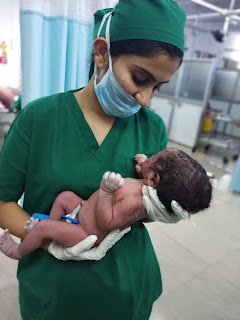January began with the excitement of nearing the end of our internship. After the debacle that was the NEET PG exam, I began with my stint in the Department of Anaesthesiology.
While most of the time, I was involved in having a look at the Pre Anaesthetic Evaluation of the patient, shifting the patient to the OT and monitoring the vitals, there was also the opportunity to intubate the patients either in the OT or in the ICU and also in giving spinal block to patients being posted for LSCS. Less often, there were also epidural anaesthesias given and Central Lines inserted. The 15 days in the Department involved elective OT, Emergency OT (which was followed by a day off) and ICU duty.
Another thing about the Anaesthesiologists in the Department was how they were always so full of questions! I particularly had an interesting time discussing with Dr C as well as Dr H who were open to all kind of answers and also provided interesting points to ponder upon.
Following this stint in Anaesthesia, it was time to get my hands dirty in surgery! And literally so; With diabetic foot debridements aplenty and the casualty bustling with head injuries, there was never a dull moment in this Department.
Although I was initially very apprehensive about my non existent surgical skills, I was extremely fortunate to be in what I would consider the best unit in surgery. Headed by Dr K who had a huge patient pull (never a day passed without patients turning up saying they were related to him and thus demanded VIP care) and with Dr N and Dr V who were good spirited and encouraging to the interns, it made for a moderately busy unit with good surgical exposure for an intern. Particular credit must be given to Dr V who almost ALWAYS made it a point to involve the interns in any decision making and gave ample opportunity to do the procedure (skin to skin). At a time when our incisions are still unsteady and prone to fishmouthing, Sir had the confidence to give us a chance to learn. We initially had Dr K as our JR who was well informed and guided us in the casualty for critical cases and later we had Dr P who was also a friendly guide in the wards and the casualty.

As a surgeon, While Hernioplasty, Lap. Cholecystectomy, mastectomy, BK/AK amputation, Trendelenburg Procedure (for patients with Varicose Veins) and cyst excisions remain the elective bread and butter, the emergencies like acute appendicitis/rupture, hollow viscus perforations are the emergency cases which would require early preparation of the patient and an operation at the earliest. Of course, there are a host of local procedures which also come under the jurisdiction of surgeons such as local cyst excisions, incision and drainage of abscesses, suprapubic catheterization, foreign body removals, excision of ingrown toe nails and many many more! Basically a general surgeon has a lot on his plate!
One of the important things I learnt in surgery is that the operation per se is only one part of the treatment provided by the surgeon. The pre operative care as well as post operative care are as important as the procedure itself and goes a long way in deciding the prognosis of the patient.
There were patients who had fairly uneventful surgeries but developed complications post operatively owing to their preoperative comorbidities such as COPD or uncontrolled Diabetes.
A particular patient I will remember is the HBsAg positive Mr. GN who came to the casualty with pain abdomen at night. When his USG happened only the next day afternoon, it revealed a case of intussusception which was operated upon the following day after ensuring he had received some nebulisation in view of his chronic smoking history. While the patient recovered quickly post operatively, he returned soon enough with abdominal wound dehiscence and swab cultures showed sensitivity only to colistin.
Mrs. S was another long term occupant in the Female S/D ward who only had her old and wrinkled husband caring for her relentlessly. Day in and day out he followed us until we made arrangements for free blood transfusion for her, until we had posted her for a below knee amputation that eventually gave her some relief.
Being a part of her OT was another memorable experience altogether with the Gigli saw!
There were a few interesting cases such as a pancreatic cancer in advanced stages. She presented with obstructive jaundice so a Triple Bypass surgery was done with a palliative perspective. There was the patient with open skull fracture who came to our casualty one evening. The contents of the cranium were clearly visible and were palpable. The patient was surprisingly stable so a quick wash and some stay sutures later, we had him rushed to NIMHANS but I had my doubts on his prognosis. Imagine my happiness when I returned after a few days leave and saw the same patient referred back from NIMHANS after an anterior cranial fossa repair and moving around normally!
Thus, after 2months of learning in the Department of Surgery, after even giving a seminar on post operative management of a surgical patient, with some wonderful memories with my co intern Sanjana, with the new junior interns, it was time to bid adieu to the last leg of my internship at Sri Chamarajendra Hospital, Hassan.










